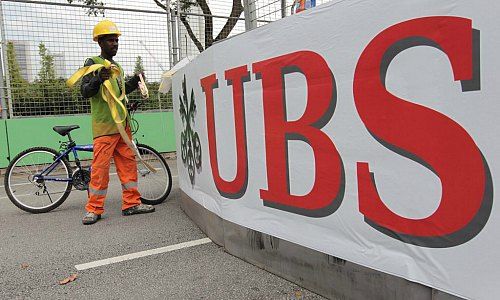UBS: Abject Failure or Purely Profit-Driven?
Given the extreme care UBS has had to take with its reputation following huge scandals in recent years, its involvement in the growing 1MDB scandal seems incredible. The bank faces a series of uncomfortable questions.
1. How Strong Was the Odor of Money-Laundering?
Overpowering: UBS Singapore accepted six transactions within five days from Swiss bank Banca della Svizzera Italiana, or BSI, and two from Deutsche Bank for an account holder domiciled in the British Virgin Islands.
Piecemeal transactions, account holders in an offshore haven, enormous sums of money and an apparent connection to political circles in a nearby country such as Malaysia, where corruption is rife – what could possibly go wrong for a bank?
2. Why No UBS Alarm Bells?
After its near-death experience in 2008, the world’s largest private bank has increasingly enforced pay-your-taxes-or-no-business-with-us rules as well as cracked down on ill-gotten funds.
CEO Sergio Ermotti and private bank boss Juerg Zeltner, who both came into their jobs following the tax scandals, had pledged themselves responsible to stakeholders for restoring the bank's past luster.
UBS runs an enormously complex compliance and surveillance system which is meant to flag anything that is untoward. The system apparently failed in this case – eight transactions with the unmistakeable odor of money-laundering passed through the bank.
3. Purely Profit-Driven?
The fact that sham entity Aabar Investments was able to maintain a UBS account doesn't speak for the effectiveness of control mechanisms at the bank. This is especially true considering that UBS never tires of saying that it checks its clients meticulously before onboarding them.
Thus it is all the more surprising that UBS has become ensnared in this massive money-laundering and corruption scandal. Was the motivation purely profit-driven? Competition in Asia is heated, but this case illustrates that shortcuts inevitably come back to haunt a firm.
4. Too Little, Too Late?
UBS posted flatter growth in net new money from Asia-Pacific in 2015 – or even outflows in some emerging markets. CEO Ermotti said that the bank was increasingly taking on «high-quality» assets only.
Asia head Edmond Koh also signaled to finews.ch that the bank was becoming more restrictive in accepting client money. The bank’s 1MDB transactions were processed the year prior. It is entirely possible that the 1MDB episode served as a wake-up call for UBS to enforce more vigilance and emphasize quality over quantity in net new money gathering.
5. Significant Personnel Announcement?
Kathryn «Kathy» Shih was responsible for UBS’ private bank in Asia for almost 30 years. She advanced to UBS top management recently, with Koh, a Singaporean, replacing her in the private banking job at the beginning of this year.
Should the bank’s worst fears over 1MDB materialize, what appeared to be a routine personnel announcement then will appear in an entirely new light. What did management in Asia know, and should it have activated UBS’ emergency brake?
6. Was BSI Scapegoated?
BSI was a «perfect victim» for Singapore regulator MAS to set an example for its banks with. The Ticino-based private bank is of a relatively small size and was set to disappear anyway as part of a previously-agreed sale to EFG International. BSI, which is fighting Swiss regulatory sanctions, clearly feels it was scapegoated. MAS may have hoped that by punishing BSI forcefully, it could halt the damage from the 1MDB scandal.
UBS’ involvement in the money-laundering scandal propels the matter into another dimension and poses a conundrum for MAS. Singapore’s sovereign wealth fund GIC is a major shareholder in UBS with nearly 6.4 percent of its stock. It will be fascinating to see how the state-controlled financial regulator deals with UBS.
7. Bank Scandal or Regulatory Scandal?
The newest allegations to surface are a catastrophe for the regulatory bodies, but especially for MAS. Singapore’s financial regulator prides itself on maintaining a clean financial center in Asia – an image which has been severely dented by 1MDB. It also shows that merely setting a precedent with BSI (see above) won’t rid Singapore of the 1MDB scandal.
Switzerland’s Finma is also in an uncomfortable position. The Swiss regulator has already been accused of proceeding too slowly against BSI and not coordinating adequately with Switzerland’s prosecutor. After BSI’s punishment, the allegations against UBS put Finma in a renewed predicament.
Finma is damned if it does, damned if it doesn’t. If the regulator isn’t seen dealing with UBS harshly enough, detractors feel vindicated with their criticism of a dual-class system for big and small banks. At the same time Finma is forced to exercise a certain amount of caution in dealing with UBS, Switzerland’s most systemically-relevant bank.






















